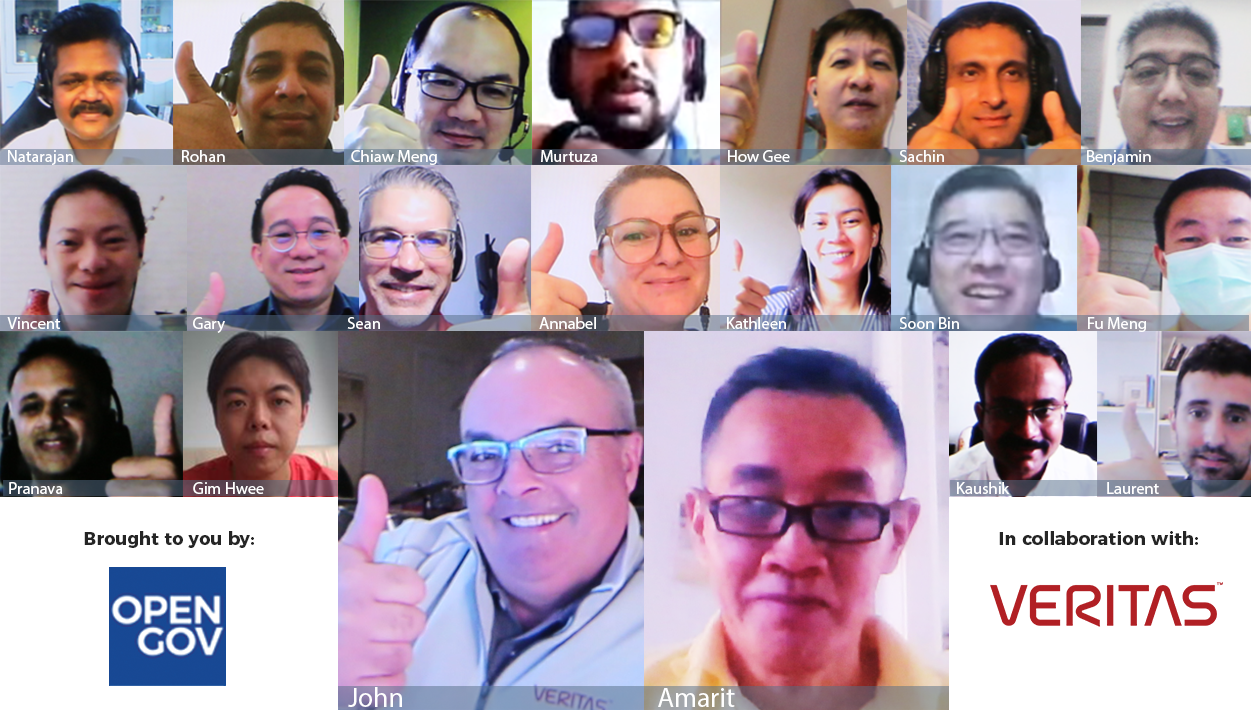
Financial institutions are scaling up the utilisation of cloud services to enable innovation and new business models, as well as to meet the exponential need for and use of data.
Changing customer expectations, the rise of FinTech, and COVID-19 are accelerating banks’ digital transformation, forcing them to upgrade their infrastructure to meet the requirements of the data-intensive era.
Customer data protection is an absolute must. If the data gets into the wrong hands, it will cost the company greatly. It can engender a loss of customer’s trust, which can put the financial company’s reputation at stake.
OpenGov Asia organised a highly timely Virtual Breakfast Insight on 2 December 2020 to discuss enhancing multi-cloud data management, data availability, insights, protection, and compliance readiness to gain the coveted competitive edge.
The session saw active participation, engagement and full attendance from some of the leading financial institutions from Singapore.
Focussing on five pillars of cloud data management strategy

The session was kick-started by Mohit Sagar, Group Managing Director, and Editor-in-Chief at OpenGov Asia. Mohit pointed to the fact that we have been inundated with data in the COVID-19 era. But he was quick to note that, in a bid to keep the lights on and sail through this difficult time, data strategy does not need to take a hit.
Data would only be valuable if we could draw actionable insights from it.
He urged the delegates to focus on the five pillars of cloud data management strategy:
(1) Security
(2) Compliance and Governance
(3) Cost Management
(4) Automation and Orchestration
(5) Performance Monitoring
Mohit emphasised that data strategy is not a zero-sum game, but it is about maintaining a delicate balance between data availability, security and insights. In the same vein, he also implored the delegates to not let governance and compliance hinder their cloud data management strategy as these should be the enablers of creating possibilities for them.
In conclusion, Mohit encouraged the delegates to incorporate a simple, secured and scalable data management system. He advised them to partner with experts in the field who can support them on this journey.
Reduce risk, optimise cost, strengthen ransomware resiliency, and manage multi-cloud environments at scale

After Mohit’s opening, Justin Loh, Country Director, Veritas Technologies shared his insights on Veritas’s Enterprise Data services platform with the audience.
Justin spoke about how the Veritas Enterprise Data service platform can help the delegates better manage, protect and simplify their data landscape.
Justin elaborated on the innovative features of their platform and how it helps customers reduce risk, optimise cost, strengthen ransomware resiliency and manage multi-cloud environments at scale.
The EDS platform allows organisations to get what matters to them most, namely: highly available apps, always protected and recoverable data, and insights that drive operational efficiency and regulatory compliance.
Justin concluded his session by sharing his observations that have been gleaned from his interaction with various business leaders. He mentioned that four key areas have been in the spotlight:
- Sustaining the business
- Cost optimisation
- Risk management & compliance
- Reinventing future business models
Infrastructure Automation, Application Modernisation and Operation Optimisation

After Justin’s presentation, Dr Amarit Laorakpong, Executive Vice President, IT Strategy and Governance Bank of Ayudhya shared his organisation’s Cloud journey with the delegates.
Dr Amarit explained that cloud security is the linchpin of their digital transformation efforts. Bank of Ayudhya (Krungsri) leverages the cloud to transform its technology infrastructure to support its digital transformation.
Dr Amarit shared how his organisation built a secured and resilient cloud-enabled infrastructure to migrate to and managed a hybrid cloud environment which resulted in:
– Accelerated application development
– Extended security posture to applications running on cloud
– Optimised costs and utilisation
He further shared that at Bank of Ayudhya, there are over 300 applications on-premise which are being slowly migrating to the cloud. There are seven domains that Krungsri are building on the cloud which are as below:
- Identity and Access Management
- Cloud Risk Governance and Compliance
- Cloud Resiliency and Incident Response
- Monitoring risk of Cloud Traffic
- Cloud Applications Security
- Cloud Infrastructure and Platform Security
- Data Protection
Dr Amarit concluded his presentation by emphasising the importance of data protection. This has gained significance in the wake of Thailand’s Personal Data Protection Act (PDPA). The act is in the process of being updated, and full implementation and compliance are expected by the middle of 2021.
Focusing on the three pillars – Data Availability, Protection, and Insights

After Dr Amarit’s thought-provoking presentation, John Abel, Senior Vice President and Chief Information Officer at Veritas Technologies shared his perspectives with the delegates.
John began by agreeing that this year has been topsy-turvy and the digital transformation efforts of most of the organisations have been disrupted due to the ongoing pandemic.
Many industries have been impacted like the travel and hospitality industry and the banking industry has had to rethink their strategy of how to serve their customers remotely and revitalising mobile applications.
He drew an interesting comparison and example of Ford Corporation and Airbnb. He spoke about how Airbnb has effectively utilised data and insights to create a better user experience.
He acknowledged the rapid transformation and the increased digital footprint of doing everything online, especially in the current landscape.
The data explosion and rapid digital transformation have also exposed organisations to a lot of external risks like ransomware and dark data. All these factors together have increased the IT complexity, making it even more challenging for the organisations to stay resilient.
John concluded his presentation by saying that he could sleep well at night because he knows where his organisation’s data is sitting, readily available and secured and that he can draw insights to the benefit of his organisation. All this is possible because of the advantages of the Enterprise Data Platform.
Polling Questions & Discussion
After the presentations from the speakers, it was time to engage in discussion with the audience through polling questions.
On the first question about the requirement that is shaping their landscape to be agile with the business needs, a majority of the audience voted for speed of change for applications, data, and building/removing core business systems while 37% voted for adapting to changing customer demands.
A senior delegate from a leading financial institution shared that incorporating the needs of the customers is of paramount importance and banks have to overcome their legacy infrastructure to be able to serve the next generation of customers.
On the next question about the biggest challenge faced by organisations when looking at digital transformation, the delegates were divided between skill shortage to implement and operate technology (33%) and dependency on the need to integrate with legacy systems and/or technology (28%). Interestingly, 22% of the delegates voted for compliance with government regulations being the biggest challenge.
One of the delegates shared that compliance invariably becomes one of the biggest challenges when it comes to accelerating the digital transformation journey. There are a lot of legacy systems in place and integrating them into the new digital platforms is a very challenging task.
The third question on evaluating new technologies and considerations being taken as a priority, there were interesting answers from the delegates. Operational simplicity and product reliability were hands down the most preferred choice of answer from the delegates ( 69%).
On the final question about the area of interest for your organisation and what do they value the most, the audience overwhelmingly voted for ease of doing business through a simplified technology consumption model (50%).
There was consensus among the delegates that simplicity is the key and is the ultimate sophistication. A delegate said, when looking for a new solution in the organisation, they ensure that it supports the latest technology to bring ease to operations and processes.
After the hugely interactive and engaging polling session, John addressed the delegates to bring the informative session to its logical end. He whole-heartedly agreed that these thought-provoking discussions and sharing by prominent Singapore financial institutions undoubtedly provided food for thought for all the participants.
John acknowledged unequivocally that this is one of the best times for IT leaders. They have to push the envelope, they need to work around the data and make sure their organisations are cyber resilient.
Mohit added that these are exciting times despite the challenges; with the right partners, leaders can get assistance along their journey of digital transformation.
















